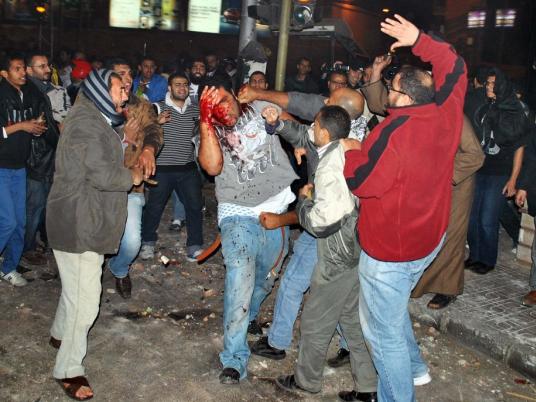
Clashes escalated between supporters and opponents of President Mohamed Morsy around the presidential palace in Heliopolis on Wednesday after the sit-in there was attacked.
The fighting broke out around 3:30 pm when Morsy supporters responded to a call from the Muslim Brotherhood to march to the palace. Opposition protesters had been staging a sit-in there following a mass rally on Tuesday against the November constitutional declaration and the hastily-conceived constitution, which was drafted by an Islamist-dominated Constituent Assembly.
Security forces retreated Tuesday night, leaving the area to protesters who surrounded the palace and quickly covered the walls with graffiti heavily attacking Morsy, dubbing him a “dictator” and demanding he leave. Some stayed for a sit-in overnight.
On Wednesday, as Vice President Mahmoud Mekky gave a press conference, Morsy supporters headed to the area surrounding the palace and forcibly dispersed the sit-in.
Earlier in the day, the Muslim Brotherhood released a statement calling for a rally by the “Brotherhood and popular forces” to protect the legitimacy of the president, the declaration and the draft constitution.
Some 17 tents that were set up around the palace were torn down and destroyed by the Morsy supporters upon their arrival. They claimed that they found alcohol in the tents. Men and women were beaten and canned food and blankets were scattered around and trampled.
The police did not intervene as the clashes developed into close-quarters fighting.
Morsy supporters said they were angered by the graffiti drawn over the palace’s walls.
“We were deeply offended by these endless insults,” said a furious Brotherhood member who went to the palace Wednesday.
“We came to protect the legitimacy of the elected president,” he said, while arguing with an opponent of Morsy.
Dozens of Morsy opponents were pushed to the side streets surrounding the palace, outraged by the sudden attack.
“They surprised us by their numbers, destroyed the tents, beat many young men and even women, and pushed us to the side streets,” one protester said.
Non-Islamist forces issued calls on Facebook and Twitter for their followers to head to the palace to support the protesters there.
At 5:30 pm, about 5,000 protesters gathered in Roxy Square near the palace, while in Merghany Street, where the palace is located, masses of Islamist protesters convened after taking control of the area and forcibly driving out the sit-in. Stones were hurled from both sides, as well as Molotov cocktails.
By 7 pm, the pro-Morsy protesters were firing birdshot ammunition at their opponents, forcing them to retreat and allowing the pro-Morsy crowd to seize Roxy Square. The attack caused the anti-Morsy crowd to run down the adjacent Khalifa al-Maamon Street, eventually causing a stampede. One man shouted while running, “Instead of unifying the people, Morsy is using militias to strike a peaceful protest.”
The pro-Morsy group abducted a number of protesters from the other side and beat them aggressively.
“I was only there to express my opinion,” anti-Morsy protester Mina Philip said, explaining that protesters from the other side attacked him, beat him and tore off his clothes while chanting, “God is great.”
Morsy’s supporters also reportedly briefly kidnapped activists Lina Megahed and Ola Shahba from the opposing side.
Central Security Forces began to appear around 8 pm, separating the battling sides, but the confrontations continued into the small alleys of Khalifa al-Maamon Street and in Roxy Square. No tear gas was fired during the security forces’ initial intervention, although this has been a common tactic in dealing with recent violent protests.
The numbers of pro-Morsy demonstrators quickly increased before rallies to support the opponents arrived, but the latter were still outnumbered well into the evening as clashes raged on.
Field hospitals were set up by anti-Morsy protesters, and some were stationed in nearby churches. Local hospitals also received some of the hundreds injured.
Toward the end of the clashes, which continued until the early hours of Thursday, Morsy’s supporters, many of whom came from outside of Cairo, declared their own sit-in. They formed committees to inspect anybody coming in and painted over anti-Morsy and Brotherhood slogans sprayed on the walls of the palace the day before.
Ashraf al-Fatateery, a member of the Salafi Dawah in Obour, was in Merghany Street all night.
“What happened yesterday is an attempt to overthrow legitimacy," he said of the opposition protests Tuesday. "In all countries of the world that respect democracy, people resort to the ballot box and respect the results of elections."
He said Morsy's supporters would do the same to protect any president in principle.
“It is not right for an elected president’s opponents to attack the presidential palace when they oppose his decisions."
But the anti-Morsy crowd challenges the legitimacy his supporters say the election granted him.
“Morsy defied legitimacy by issuing his constitutional declaration and then using armed militias against peaceful protesters. For me, he is no longer a legitimate president," said anti-Morsy protester Ahmed Abdel Rahman.
"This is the same scenario of the Battle of the Camel," he said, referring to 2011 incident when Mubarak regime loyalists attacked protesters in Tahrir Square during the 18-day uprising. "Our protest was peaceful and it was they who started the violence.”




